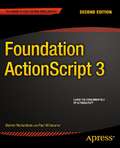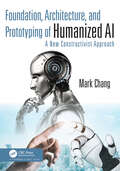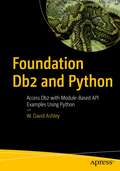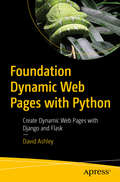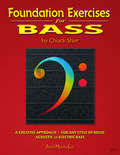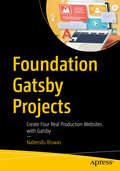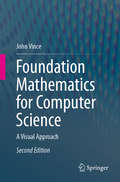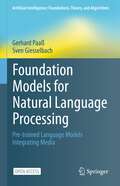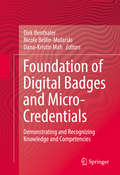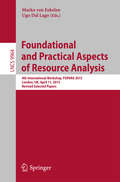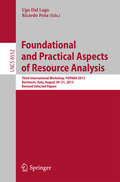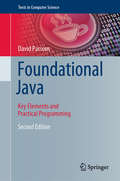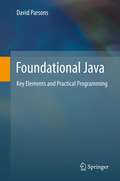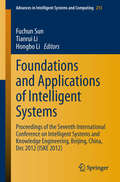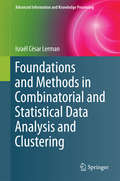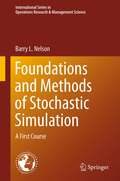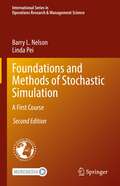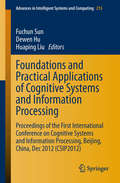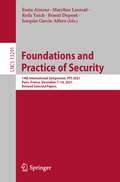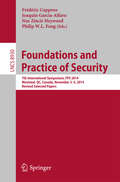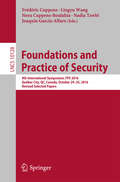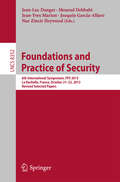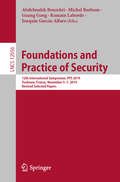- Table View
- List View
Foundation ActionScript 3
by Darren Richardson Paul MilbourneActionScript 3 is a full-fledged programming language, with complete object-oriented capabilities, event handling, sound and video support, drawing capabilities, support for regular expressions, and much more. Whether you are just starting out on the road to computer programming and animation or an experienced developer who wants to learn a new language, you'll find all you need to know in Foundation ActionScript 3. Starting with the fundamentals, you'll learn how to add interactivity to your Flash movies by using ActionScript objects, manipulating sound and video, and harnessing the power of regular expressions and XML. The book concludes with two case studies to consolidate what you've learned and introduce some additional advanced techniques. You'll gain a solid understanding of the exciting world of ActionScript 3 and see how everything fits together, so you'll be able to build your own professional applications. The sensible layout of the book makes it easy to find information about specific techniques. It focuses on the essential skills that will enable you to get up and running quickly. With this book as your guide, you'll be creating killer Flash applications before you know it. What you'll learn Learn the fundamentals of ActionScript 3. Use ActionScript 3's object-oriented features Manipulate sound and video to produce exciting modern web applications Work with XML as your data source Who this book is for Whether you're completely new to ActionScript or you're coming from a previous version, Foundation ActionScript 3 will teach you all you need to know to get up and running with AS3 in no time. Table of Contents Getting Started with ActionScript 3 ActionScript 3 Fundamentals Objects and Classes Working with the Display Creating Vector Graphics with the Drawing API User Interaction and More with Events Working with Video Using Audio Working with Components Regular Expressions Using XML Case Study: Creating a Dynamic Image Viewer Getting Started with Flex Flex by Example
Foundation, Architecture, and Prototyping of Humanized AI: A New Constructivist Approach
by Mark ChangHumanized AI (HAI), emerging as the next of the AI waves, refers to artificial social beings that are very close to humans in various aspects, beings who are machine-race humans, not digital slaves. Foundation, Architecture, and Prototyping of HAI deploy a novel smalldata approach to vertically explore the spectrum of HAI. Different from the popular big-data philosophy that is based on the rigid notion that the connotation of each concept is fixed and the same to everyone, this book treats understanding as a process from simple to complex, and uses the similarity principle to effectively deal with novelties. Combining the efficiency of the Behaviorists’ goal-driven approach and the flexibility of a Constructivists’ approach, both the architecture of HAI and the philosophical discussions arising from it are elaborated upon. Advancing a unique approach to the concept of HAI, this book appeals to professors and students of both AI and philosophy, as well as industry professionals looking to stay at the forefront of developments within the field.
Foundation Course 2
by P. G. Shinde Mahesh Bhagwat Namita Nimbalkar Meghna Shinde ChakneAll the topics in this book are of great relevance to our everyday life like Significant, Contemporary Rights of Citizens,Right to Information,Environmental Ethics,Some significant modern technologies, their basic features and applications etc.
Foundation Course 2 (S.Y.B.A. / B.Com. / B.Sc),Semester 3
by P. G. Shinde Mahesh Bhagwat Namita Nimbalkar Meghna Shinde ChakneAll the topics in this book are of great relevance to our everyday life like Human Rights Violations and Redressal,Dealing With Environmental Concerns etc and the text encourages the students in internalising the messages.
Foundation Db2 and Python: Access Db2 with Module-Based API Examples Using Python
by W. David AshleyWork with Db2 to write SQL and access databases using optimized code for the fastest response. This book will give you complete documentation on DB2 via Python for the IBM_db module and provide a number of examples for the usage of each module API.Begin by getting your free version of Db2 for Linux and Windows. While the book concentrates more on the Linux version of Db2, it also covers enough of the Windows version so that you're comfortable with obtaining and installing Db2 on your version of Windows. Next, you'll see how to install the sample database that comes with Db2, and take some data from the web to design a database around it, including tables and indexes.For Db2 to be really useful you need to use strong SQL expressions. This book provides specific examples of how to avoid using poor ones that can cause extra processing time for the query. Lastly, you'll look at each API in the ibm_db and ibm_db_dbi module. This module is not sponsored by IBM and must be installed separately from the Db2 database.After reading Foundation Db2 and Python you'll be able to install Db2 on Windows or Linux, and perform backups and restore data. What You'll LearnObtain and install Db2 properly on Linux and WindowsCreate databases and load them on Db2Work with ibm_db and ibm_db_dbi API modules for PythonWrite SQL for Db2Review the future of the ibm_db Python module Who This Book Is ForPython programmers and DB2 administrators interested in building application with Python and DB2
Foundation Dynamic Web Pages with Python: Create Dynamic Web Pages with Django and Flask
by David AshleyDiscover the concepts of creating dynamic web pages (HTML) with Python. This book reviews several methods available to serve up dynamic HTML including CGI, SSI, Django, and Flask. You will start by covering HTML pages and CSS in general and then move on to creating pages via CGI. It is easy to use and can serve as a foundation for the more advanced services available for launching dynamic web pages. Next you'll explore the SSI (Server Side Interface) method. This is a slightly more advanced interface included in mots web servers that adds functionality to modify static HTML pages to add such things as the current date or time, include additional HTML, and other features to a static web page before it is delivered to the user. The book also covers some of the key the Django module features, which must be added to the web server. These features include creating dynamic web pages and calling a database to provide additional information to the web page. Lastly you will explore the Flask module. While it has limited functionality on its own, it provides a very flexible environment to create a self designed system for delivery of dynamic web pages.By the time you finish this book, you will be able to choose the appropriate methodology for delivering dynamic information using fast HTML creation services.What You'll LearnUse HTML pages and CSS together to control the style of your web site.Install and configure SSI, Django, and Flask for Apache.Create dynamic web pages using CGI and creating a library of partial HTML pages to use in this task.Build dynamic web pages using SSI and auxiliary Python programs to enhance the SSI functionality.Develop dynamic web pages using Django.Who This Book Is ForSoftware Developers with basic Python programming skills interested in learning Web Development
Foundation Exercises For Bass
by Sher Music Chuck SherThis book is designed to teach the fundamentals of bass playing to anyone, regardless of the style of music or level of the player. For electric or acoustic bass, it shows how to practice scales, arpeggios, rhythms, ear training, bass line construction, and more in a creative way that makes learning to play music fun! Endorsed by Marc Johnson, Larry Grenadier, Bobby Vega, Steve Swallow, etc.
Foundation Gatsby Projects: Create Four Real Production Websites with Gatsby
by Nabendu BiswasEnhance your Gatsby skillset by building a series of ready-to-use web sites. With the aid of four projects, this book teaches you how to use Gatsby alongside the latest technologies, including Contentful, Twillio, and Stackbit. In the first project, you will create a simple agency site with a contact form and deploy it to Netlify. You'll then quickly be able to create other basic client sites. Next, you will learn to set up a blog site using Stackbit and Dev CMS. Other projects include a large site built with Contentful and a video chat using Twilio. Many Gatsby tutorials out there today only cover how to create blog sites – get ahead of the crowd using this book today. What You'll Learn Use Contentful CMS with GatsbyBuild sites quickly with Stackbit serviceDevelop a video chat site similar to Skype with Twilio services Deploy all sites in NetlifyAdd functionalities with the powerful Gatsby plugin ecosystem Integrate advertisements Who This Book Is For Anyone who wants to create a site using Gatsby. A little knowledge of React is expected but is not a necessity. You will need to be familiar with JavaScript concepts and be confident with basic web development.
Foundation Mathematics for Computer Science: A Visual Approach
by John VinceIn this second edition of Foundation Mathematics for Computer Science, John Vince has reviewed and edited the original book and written new chapters on combinatorics, probability, modular arithmetic and complex numbers. These subjects complement the existing chapters on number systems, algebra, logic, trigonometry, coordinate systems, determinants, vectors, matrices, geometric matrix transforms, differential and integral calculus. During this journey, the author touches upon more esoteric topics such as quaternions, octonions, Grassmann algebra, Barrycentric coordinates, transfinite sets and prime numbers. John Vince describes a range of mathematical topics to provide a solid foundation for an undergraduate course in computer science, starting with a review of number systems and their relevance to digital computers, and finishing with differential and integral calculus. Readers will find that the author’s visual approach will greatly improve their understanding as to why certain mathematical structures exist, together with how they are used in real-world applications. This second edition includes new, full-colour illustrations to clarify the mathematical descriptions, and in some cases, equations are also coloured to reveal vital algebraic patterns. The numerous worked examples will help consolidate the understanding of abstract mathematical concepts. Whether you intend to pursue a career in programming, scientific visualisation, artificial intelligence, systems design, or real-time computing, you should find the author’s literary style refreshingly lucid and engaging, and prepare you for more advanced texts.
Foundation Models for Natural Language Processing: Pre-trained Language Models Integrating Media (Artificial Intelligence: Foundations, Theory, and Algorithms)
by Gerhard Paaß Sven GiesselbachThis open access book provides a comprehensive overview of the state of the art in research and applications of Foundation Models and is intended for readers familiar with basic Natural Language Processing (NLP) concepts. Over the recent years, a revolutionary new paradigm has been developed for training models for NLP. These models are first pre-trained on large collections of text documents to acquire general syntactic knowledge and semantic information. Then, they are fine-tuned for specific tasks, which they can often solve with superhuman accuracy. When the models are large enough, they can be instructed by prompts to solve new tasks without any fine-tuning. Moreover, they can be applied to a wide range of different media and problem domains, ranging from image and video processing to robot control learning. Because they provide a blueprint for solving many tasks in artificial intelligence, they have been called Foundation Models. After a brief introduction to basic NLP models the main pre-trained language models BERT, GPT and sequence-to-sequence transformer are described, as well as the concepts of self-attention and context-sensitive embedding. Then, different approaches to improving these models are discussed, such as expanding the pre-training criteria, increasing the length of input texts, or including extra knowledge. An overview of the best-performing models for about twenty application areas is then presented, e.g., question answering, translation, story generation, dialog systems, generating images from text, etc. For each application area, the strengths and weaknesses of current models are discussed, and an outlook on further developments is given. In addition, links are provided to freely available program code. A concluding chapter summarizes the economic opportunities, mitigation of risks, and potential developments of AI.
Foundation of Digital Badges and Micro-Credentials
by Dirk Ifenthaler Nicole Bellin-Mularski Dana-Kristin MahThis edited volume provides insight into how digital badgesmay enhance formal, non-formal and informal education by focusing on technicaldesign issues including organizational requirements, learning and instructionaldesign, as well as deployment. It features current research exploring thetheoretical foundation and empirical evidence of the utilization of digitalbadges as well as case studies that describe current practices and experiencesin the use of digital badges for motivation, learning, and instruction in K-12,higher education, workplace learning, and further education settings.
Foundational and Practical Aspects of Resource Analysis
by Marko Van Eekelen Ugo Dal LagoThis book constitutes the proceedings of the 4th International Workshop on Foundational and Practical Aspects of Resource Analysis, FOPARA 2015, held in London, UK, in April 2015. The 6 papers presented in this volume were carefully reviewed and selected from 7 submissions.
Foundational and Practical Aspects of Resource Analysis
by Ugo Dal Lago Ricardo PeñaThis book constitutes the proceedings of the Third International Workshop on Foundational and Practical Aspects of Resource Analysis, FOPARA 2013, held in Bertinoro, Italy, in August 2013. The 9 papers presented in this volume were carefully reviewed and selected from 12 submissions. They deal with traditional approaches to complexity analysis, differential privacy, and probabilistic analysis of programs.
Foundational Java: Key Elements and Practical Programming (Texts in Computer Science)
by David ParsonsJava is now well-established as one of the world’s major programming languages, used in everything from desktop applications to web-hosted applications, enterprise systems and mobile devices. Java applications cover cloud-based services, the Internet of Things, self-driving cars, animation, game development, big data analysis and many more domains.The second edition of Foundational Java: Key Elements and Practical Programming presents a detailed guide to the core features of Java – and some more recent innovations – enabling the reader to build their skills and confidence though tried-and-trusted stages, supported by exercises that reinforce the key learning points. All the most useful and commonly applied Java syntax and libraries are introduced, along with many example programs that can provide the basis for more substantial applications. Use of the Eclipse Integrated Development Environment (IDE) and the JUnit testing framework is integral to the book, ensuring maximum productivity and code quality when learning Java, although to ensure that skills are not confined to one environment the fundamentals of the Java compiler and run time are also explained. Additionally, coverage of the Ant tool will equip the reader with the skills to automatically build, test and deploy applications independent of an IDE.Topics and features:• Presents the most up-to-date information on Java, including Java 14• Examines the key theme of unit testing, introducing the JUnit 5 testing framework to emphasize the importance of unit testing in modern software development• Describes the Eclipse IDE, the most popular open source Java IDE and explains how Java can be run from the command line• Includes coverage of the Ant build tool• Contains numerous code examples and exercises throughout• Provides downloadable source code, self-test questions, PowerPoint slides and other supplementary material at the website http://www.foundjava.comThis hands-on, classroom-tested textbook/reference is ideal for undergraduate students on introductory and intermediate courses on programming with Java. Professional software developers will also find this an excellent self-study guide/refresher on the topic.Dr. David Parsons is National Postgraduate Director at The Mind Lab, Auckland, New Zealand. He has been teaching programming in both academia and industry since the 1980s and writing about it since the 1990s.
Foundational Java
by David ParsonsThis book presents a guide to the core features of Java - and some more recent innovations - enabling the reader to build skills and confidence though tried-and-trusted stages, supported by exercises that reinforce key learning points. All of the most useful and commonly applied Java syntax and libraries are introduced, along with many example programs that can provide the basis for more substantial applications. Use of the Eclipse IDE and the JUnit testing framework is integral to the book, ensuring maximum productivity and code quality, although to ensure that skills are not confined to one environment the fundamentals of the Java compiler and run time are also explained. Additionally, coverage of the Ant tool will equip the reader with the skills to automatically build, test and deploy applications independent of an IDE. Features: presents information on Java 7; contains numerous code examples and exercises; provides source code, self-test questions and PowerPoint slides at an associated website.
Foundations and Applications of Intelligent Systems
by Fuchun Sun Tianrui Li Hongbo LiThese proceedings present technical papers selected from the 2012 International Conference on Intelligent Systems and Knowledge Engineering (ISKE 2012), held on December 15-17 in Beijing. The aim of this conference is to bring together experts from different fields of expertise to discuss the state-of-the-art in Intelligent Systems and Knowledge Engineering, and to present new findings and perspectives on future developments. The proceedings introduce current scientific and technical advances in the fields of artificial intelligence, machine learning, pattern recognition, data mining, knowledge engineering, information retrieval, information theory, knowledge-based systems, knowledge representation and reasoning, multi-agent systems, and natural-language processing, etc. Furthermore they include papers on new intelligent computing paradigms, which combine new computing methodologies, e. g. , cloud computing, service computing and pervasive computing with traditional intelligent methods. By presenting new methodologies and practices, the proceedings will benefit both researchers and practitioners who want to utilize intelligent methods in their specific fields. Dr. Fuchun Sun is a professor at the Department of Computer Science & Technology, Tsinghua University, China. Dr. Tianrui Li is a professor at the School of Information Science & Technology, Southwest Jiaotong University, Chengdu, China. Dr. Hongbo Li also works at the Department of Computer Science & Technology, Tsinghua University, China.
Foundations and Methods in Combinatorial and Statistical Data Analysis and Clustering
by Israël César LermanThis bookoffers an original and broad exploration of the fundamental methods in Clusteringand Combinatorial Data Analysis, presenting new formulations and ideas withinthis very active field. With extensive introductions, formal andmathematical developments and real case studies, this book provides readerswith a deeper understanding of the mutual relationships between these methods,which are clearly expressed with respect to three facets: logical,combinatorial and statistical. Usingrelational mathematical representation, all types of data structures can behandled in precise and unified ways which the author highlights in three stages: Clustering a set of descriptive attributes Clustering a set of objects or a set of objectcategories Establishing correspondence between these twodual clusterings Tools forinterpreting the reasons of a given cluster or clustering are also included. Foundations and Methods in Combinatorial andStatistical Data Analysis and Clustering will be a valuable resource for students andresearchers who are interested in the areas of Data Analysis, Clustering, DataMining and Knowledge Discovery.
Foundations and Methods of Stochastic Simulation
by Barry NelsonThis graduate-level text covers modeling, programming and analysis of simulation experiments and provides a rigorous treatment of the foundations of simulation and why it works. It introduces object-oriented programming for simulation, covers both the probabilistic and statistical basis for simulation in a rigorous but accessible manner (providing all necessary background material); and provides a modern treatment of experiment design and analysis that goes beyond classical statistics. The book emphasizes essential foundations throughout, rather than providing a compendium of algorithms and theorems and prepares the reader to use simulation in research as well as practice. The book is a rigorous, but concise treatment, emphasizing lasting principles but also providing specific training in modeling, programming and analysis. In addition to teaching readers how to do simulation, it also prepares them to use simulation in their research; no other book does this. An online solutions manual for end of chapter exercises is also be provided.
Foundations and Methods of Stochastic Simulation: A First Course (International Series in Operations Research & Management Science #316)
by Barry L. Nelson Linda PeiThis graduate-level textbook covers modelling, programming and analysis of stochastic computer simulation experiments, including the mathematical and statistical foundations of simulation and why it works. The book is rigorous and complete, but concise and accessible, providing all necessary background material. Object-oriented programming of simulations is illustrated in Python, while the majority of the book is programming language independent. In addition to covering the foundations of simulation and simulation programming for applications, the text prepares readers to use simulation in their research. A solutions manual for end-of-chapter exercises is available for instructors.
Foundations and Practical Applications of Cognitive Systems and Information Processing
by Fuchun Sun Dewen Hu Huaping Liu"Foundations and Practical Applications of Cognitive Systems and Information Processing" presents selected papers from the First International Conference on Cognitive Systems and Information Processing, held in Beijing, China on December 15-17, 2012 (CSIP2012). The aim of this conference is to bring together experts from different fields of expertise to discuss the state-of-the-art in artificial cognitive systems and advanced information processing, and to present new findings and perspectives on future development. This book introduces multidisciplinary perspectives on the subject areas of Cognitive Systems and Information Processing, including cognitive sciences and technology, autonomous vehicles, cognitive psychology, cognitive metrics, information fusion, image/video understanding, brain-computer interfaces, visual cognitive processing, neural computation, bioinformatics, etc. The book will be beneficial for both researchers and practitioners in the fields of Cognitive Science, Computer Science and Cognitive Engineering. Fuchun Sun and Huaping Liu are both professors at the Department of Computer Science & Technology, Tsinghua University, China. Dr. Dewen Hu is a professor at the College of Mechatronics and Automation, National University of Defense Technology, Changsha, China.
Foundations and Practice of Security: 14th International Symposium, FPS 2021, Paris, France, December 7–10, 2021, Revised Selected Papers (Lecture Notes in Computer Science #13291)
by Esma Aïmeur Maryline Laurent Reda Yaich Benoît Dupont Joaquin Garcia-AlfaroThis book constitutes the revised selected papers of the 14th International Symposium on Foundations and Practice of Security, FPS 2021, held in Paris, France, in December 2021. The 18 full papers and 9 short paper presented in this book were carefully reviewed and selected from 62 submissions. They cover a range of topics such as Analysis and Detection; Prevention and Efficiency; and Privacy by Design. Chapters “A Quantile-based Watermarking Approach for Distortion Minimization”, “Choosing Wordlists for Password Guessing: An Adaptive Multi-Armed Bandit Approach” and “A Comparative Analysis of Machine Learning Techniques for IoT Intrusion Detection” are available open access under a Creative Commons Attribution 4.0 International License via link.springer.com.
Foundations and Practice of Security
by Frédéric Cuppens Joaquin Garcia-Alfaro Nur Zincir Heywood Philip W. L. FongThis book constitutes the thoroughly refereed post-proceedings of the 7th Symposium on Foundations and Practice of Security, FPS 2014, held in Montreal, QC, Canada, in November 2014. The 18 revised full papers presented together with 5 short papers and 2 position papers were carefully reviewed and selected from 48 submissions. The papers are organized in topical sections on privacy; software security and malware analysis; network security and protocols; access control models and policy analysis; protocol verification; and cryptographic technologies.
Foundations and Practice of Security
by Frédéric Cuppens Lingyu Wang Nora Cuppens-Boulahia Nadia Tawbi Joaquin Garcia-AlfaroThis book constitutes the carefully refereed and revised selected papers of the 4th Canada-France MITACS Workshop on Foundations and Practice of Security, FPS 2011, held in Paris, France, in May 2011. The book contains a revised version of 10 full papers, accompanied by 3 keynote addresses, 2 short papers, and 5 ongoing research reports. The papers were carefully reviewed and selected from 30 submissions. The topics covered are pervasive security and threshold cryptography; encryption, cryptanalysis and automatic verification; and formal methods in network security.
Foundations and Practice of Security
by Jean Luc Danger Mourad Debbabi Jean-Yves Marion Joaquin Garcia-Alfaro Nur Zincir HeywoodThis book constitutes the carefully refereed post-proceedings of the 6th Symposium on Foundations and Practice of Security, FPS 2013, held in La Rochelle, France, in October 2013. The 25 revised full papers presented together with a keynote address were carefully reviewed and selected from 65 submissions. The papers are organized in topical sections on security protocols, formal methods, physical security, attack classification and assessment, access control, cipher attacks, ad-hoc and sensor networks, resilience and intrusion detection.
Foundations and Practice of Security: 12th International Symposium, FPS 2019, Toulouse, France, November 5–7, 2019, Revised Selected Papers (Lecture Notes in Computer Science #12056)
by Joaquin Garcia-Alfaro Michel Barbeau Abdelmalek Benzekri Guang Gong Romain LabordeThis book constitutes the revised selected papers of the 12th International Symposium on Foundations and Practice of Security, FPS 2019, held in Toulouse, France, in November 2019.The 19 full papers and 9 short papers presented in this book were carefully reviewed and selected from 50 submissions. They cover a range of topics such as machine learning approaches; attack prevention and trustworthiness; and access control models and cryptography.
